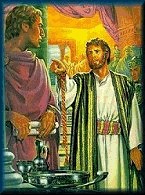 |
 |
|
Clerics Lash Out! 1979 Yearbook of Jehovah's Witnesses,
pp. 93-4. One of the earliest congregations of Jehovah’s people to be established in Canada was the one at Hamilton, Ontario. That strong, very active congregation naturally had the disapproval of the clergy. Not having any Biblical defense against the forceful thrusts of the truth, the clerics resorted to personal invective. They lashed out in a seemingly desperate attempt to destroy one man—C. T. Russell. A clergyman who used this approach at Hamilton was a bombastic Baptist preacher named J. J. Ross. In 1912, he wrote a scurrilous pamphlet in which he made many false accusations against Russell. Acting on the advice of his legal counselor, J. F. Rutherford, Brother Russell laid a criminal charge of defamatory libel against Ross. As the complainant, Russell attended the trial to give evidence, and he submitted to a long cross-examination of roughly five hours. After the trial, his Baptist opponent falsely charged that Russell had committed perjury when asked about his knowledge of Greek. This "perjury" charge was published in Ross’ second pamphlet attacking Russell. In it the cleric misquoted what had been said in court, giving the cross-examiner’s question and Russell’s reply as follows: Q. "Do you know the Greek?" A. "Oh, yes." By omitting the word "alphabet" from this question, Ross sought to establish an exact contradiction with a later question and answer: Q. "Are you familiar with the Greek language?" A. "No." What really happened is clear from the official record (Police Court of the City of Hamilton, Ontario, March 17, 1913). It shows that C. T. Russell did not commit perjury. The cross-examination (by George Lynch-Staunton, K. C.) went as follows, according to the book Jehovah’s Witnesses in Canada, by M. James Penton: "Question: ‘You don’t profess, then, to be schooled in the Latin language?’ Answer: ‘No, Sir.’ Question: ‘Or in Greek?’ Answer: ‘No, Sir.’" After this, Russell was asked if he knew individual Greek letters, and he said that he "might make a mistake of some of them." According to the book just cited, shortly thereafter "Lynch-Staunton asked Russell the question: ‘Are you familiar with the Greek language?’ Russell’s reply was an emphatic ‘No.’" So, there was no question about matters. C. T. Russell had not committed perjury as Ross falsely charged after the trial. The case itself later went before a grand jury, which declined to return a bill of indictment. So, the case never went on for trial before the Supreme Court of Ontario. Under legal practice in Ontario, only the crown attorney is allowed to speak before the grand jury. We do not know how the case was presented to it or what caused that body to reject it. No decision ever was rendered on the merits of the case. In his subsequent writings, Ross treated this inconclusive result as though he had won a great victory. He and others apparently chose to forget that Russell was not the man on trial.
Next article: Did he say 'leave the Bible unread'? ("Questions From Readers," The Watchtower, July 1, 1957, pp. 414-5.) |
| Home
| Contents Last revised: 97/11/09. Copyright © 1997 by Jehovah's Witnesses—Setting the Record Straight. All rights reserved. This web site is not affiliated with or sanctioned by the Watchtower Bible and Tract Society. However, every effort has been made to adhere to the current views published by the "faithful and discreet slave" (Matthew 24:45; Luke 12:42) through the Watchtower Bible and Tract Society. The "Official Web Site of Jehovah's Witnesses" can be found at http://www.jw.org, and should be recognized as the authoritative source about the beliefs, teachings, and activities of Jehovah's Witnesses. |